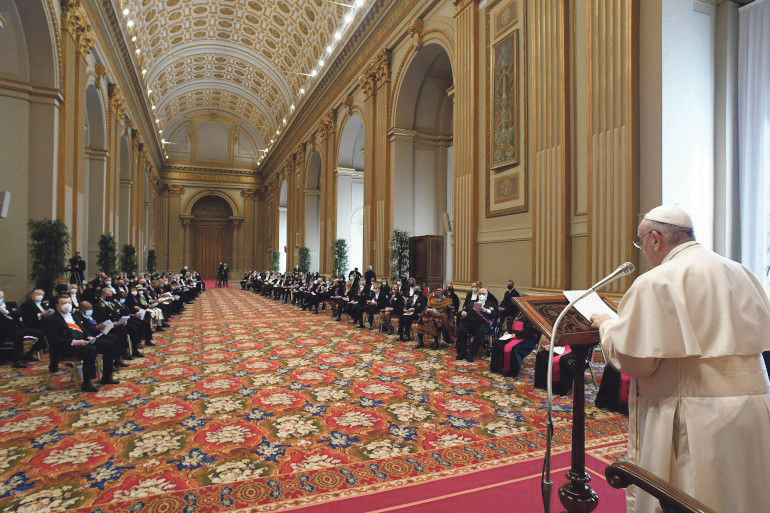WelCom March 2021

Photo: CNS/Vatican Media
In his annual foreign policy address, Pope Francis exhorted global governments to emerge from the coronavirus pandemic focused on creating a fairer market economy, addressing the rapidly escalating dangers of climate change, and providing basic healthcare to their citizens.
In his address, on 8 February 2021 to the 183 ambassadors accredited to the Holy See, the pontiff said the pandemic had shone a light on the crises facing the world and ‘set before us a choice: either to continue on the road we have followed until now, or to set out on a new path.’
Among the elements Francis said would mark that new path were: universal access to basic healthcare; equitable distribution of coronavirus vaccines; an effective agreement at the next UN Climate Change Conference being held in Glasgow in November this year; and a rethinking of the relationship between individuals and the economy.
On the last point, the Pope likened the need for changes to the global market system as akin to the 17th-century realisation that the earth revolved around the sun, saying it is time ‘for a kind of “new Copernican revolution” that can put the economy at the service of men and women, not vice versa.’
The Pope stressed that fraternity is the cure for the numerous crises unleashed by the pandemic and for other problems affecting the world, the most serious of which is ‘the crisis of human relationships, as the expression of a general anthropological crisis, dealing with the very conception of the human person and his or her transcendent dignity’.
‘I am convinced that fraternity is the true cure for the pandemic and the many evils that have affected us. Along with vaccines, fraternity and hope are, as it were, the medicine we need in today’s world,’ the Pope said.
The address was held in a larger hall at the Vatican than usual to allow for social distancing among the approximately 80 ambassadors who attended.
The Pope said the world is facing crises in five interlocking areas: in health; on the environment; on economic and social issues; in politics; and in human relationships.
The crisis in politics, he said, is ‘much deeper’ than the other crises, resulting in ‘the increase in political conflicts and the difficulty, if not actually the inability, to seek common and shared solutions to the problems afflicting our world’.
‘This has been a growing trend, one that is becoming more and more widespread also in countries with a long tradition of democracy,’ he said.
The Pope also addressed the recent military coup in Myanmar, calling on the nation’s imprisoned political leaders to be ‘promptly released’. Among other areas of concern, Francis mentioned conflicts in Syria, the Central African Republic, Libya, Lebanon and the conflict between Israelis and Palestinians.
Sources: Vatican News, National Catholic Reporter